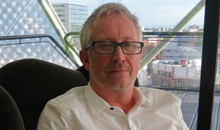Graham Brown-Martin ,
You were expelled from school when you were 15 and you're now the author of a transmedia work on the need to reimagine learning. What conclusions can you draw from that, from failing at school?
There are two fails: that of the students and that of the teachers. The teachers enter school dreaming that they'll be teaching their students to do wonderful things with their lives and instead they end up becoming foremen in a factory who are paid to keep an eye on the students and test them. Our education system is all about standardization, and assessments colour everything. As a result, only a few children fit in with what is considered to be "normal". Those who are bored or who have ADHD, like I do, are labelled, left out or medicated so that they behave. In all, it's an aberration.
Perhaps that's why you founded the Learning Without Frontiers think tank in 2004. What concerns you now about education?
We need an alternative model and society has to talk openly about it: do we want to train students so that they spend the day, from 8 am to 8 pm, in an office without any contact with the outside world or with their families? To change education, we have to change the economic system in which we're immersed, as it's a global problem. I've known Silicon Valley and Facebook first-hand, and for me they're no different from the stock market. We need to wake up! Behind the private schools there are companies, and exams are a business and a way of controlling the content, our minds.
Would you rate the education system as obsolete?
If you ask a student what school's for, they'll tell you it's to pass exams, and that is unutterably sad. There's an old idea that horrifies me, which sees school as though it were a factory. It's an industrial complex as it focuses on increasing productivity and on controlling students with assessments. We should forget about exams, about subjects and about labels and focus on the students realizing themselves. And that's why we have to trust the role of committed teachers. Luckily, I've known many; now we just need the politicians to be like them, too!
What skills should we be passing on to students?
I sometimes ask myself: "Who was it who invented separate subjects at school?" If we want innovation and creativity, we need to teach students diversity, to integrate engineering with art... We have to show them this plurality, stop imposing on them what they should think and read. The teacher should be a trusted friend, a guide who encourages the students to learn through experience, as this way education will become part of a global social transformation.
How can this educational revolution come about?
I would ask people to re-read Marx, Pierre Bourdieu or Antonio Gramsci to understand that education is a structure like religion or the media and that it serves to maintain the status quo. We need to return to the essence, for education to be like theatre: one person who sits down in front of another and that's how they communicate. With all that, technology can be a plus, but it's not innocent. Therefore, we have to make sure that putting computers in classrooms doesn't become little more than mere Taylorism. We need teachers who impart knowledge, not technicians who are shoe-horned into the system! Only civil society can bring about this change.
You also have first-hand experience of so-called "transformative experiences" in education through new technologies...
Yes. We could say that for two years, with the Learning {RE}imagined project, I've been an education tourist and I've seen that these transformations can be very cheap. For example, I've seen it in Ghana and on the African continent, where distributing books is incredibly expensive. We carried out an action there that wasn't at all expensive which consisted of giving every student a Kindle. It was fantastic as it allowed them to read when it was very sunny and they took the device home with them, so the teachers could prepare the next classes better. Let's not forget that the vast majority of people live like this, without electricity and without economical access to the Internet.
What conclusions have you reached based on your exhaustive research work?
There are symptoms of unease in civil society. On the one hand, we need entrepreneurs and innovation, and on the other, schools simply train factory workers, automata, and forget plurality and critical thought. I've met many impassioned teachers who can make students an agent of change, and they've all detected this shortcoming; the problem is that they don't talk to each other. That's why I wrote the Learning {Re}imagined book, so they can share this.
You talk of reimagining learning. How do you see the near future?
The future isn't a place; it will be what civil society decides and creates, but let's remember that education does not have to be forced into this technological determinism. I might seem an idealist, but for me education is to do with the great challenges of our society, with the fact of creating a better planet, and I don't want schools where the teachers who teach are technicians, but schools where they are artisans.
Press contact
-
Editorial department

